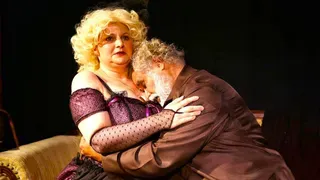June 26, 2009
Whatever Works
Kilian Melloy READ TIME: 3 MIN.
One has to wonder if Woody Allen, who turns 74 this year, is in a valedictory frame of mind. If so, Whatever Works--this year's feature film from a director who has made a movie a year for the last 30-odd years--seems fitting, if weary and a bit thin.
Allen stays behind the camera, letting Larry David (of "Curb Your Enthusiasm" fame, as well as being a co-creator of "Seinfeld") take on the Woody Allen role. You know the role I mean: the older man who, despite night terrors and neuroses, somehow finds himself hooked up with an attractive younger woman.
David doesn't try to be Woody Allen, and he doesn't need to. David has his own crabby, fretful take on life, which he assures us (the audience whom only his character, Boris Yelnikoff, knows is out there) is a sucking wound of pure horror. "Horror!" It's Yellnikoff's favorite word.
Yellnikoff embraces all the Woody Allen motifs, and how. He lives in a rat-trap apartment and barely makes a living teaching (perhaps terrorizing would be a better word for it) young chess students. But Yellnikoff didn't always used to exist in such circumstances: he was once a physicist and professor at Columbia. His specialty is string theory, a bit of biographical information we would have sussed out quickly enough even if he hadn't told us in a direct-to-the-camera address. (Allen sees fit to underscore the joke here by adding in string-driven classical music.)
Yellnikoff's friends still inhabit the better parts of town and higher social spheres of career and companionship; Yellnikoff enjoys respite from his hell-hole of a life by hanging out with them for Friday evenings spent playing music or philosophizing in delis. It's not a bad life, even if it is the equivalent of a one-note song.
Then along comes Melodie (Evan Rachel Wood), a rural beauty queen with a sunny disposition who breezes past the ramparts Yellnikoff has erected around his life. Unfazed by Yellnikoff's nightmares and early-morning jitters, Melodie embraces everything her new mentor has to teach her: entropy reigns supreme; life is only marginally less terrifying than death; cliches are worse than existential angst.
What Yellnikoff won't cop to is that Melodie rubs off on him, as well, and when the two marry his litany of gripes remains the same--but his mood lightens up. Now his jokes crackle with a nasty malice, which lights up the room whenever one or the other of Melodie's estranged, religious fanatic parents find their way to Yellnikoff's neck of the slums.
Melodie, it turns out, was just the start: if the universe is cruel, it also has a thorny sense of humor, and Yellnikoff serves as the anchor for lives in transition. Repressed housewives burst their shackles to become New York artistes (and sexual libertines); even-more-repressed family men stumble out of their personal labyrinths and into the fresh air of personal acceptance. British emigrees who would otherwise be considered stalkers take on a sheen of gallant romanticism. Even suicide attempts have happy endings.
After all this time and all these fits of nervous, semi-philosophical natter, this is where Allen has arrived: who knows what life is all about? Probably, it's about nothing (which makes Larry David an even more inspired casting choice). In the end, if it makes you happy, you gotta go for it.
Kilian Melloy serves as EDGE Media Network's Associate Arts Editor and Staff Contributor. His professional memberships include the National Lesbian & Gay Journalists Association, the Boston Online Film Critics Association, The Gay and Lesbian Entertainment Critics Association, and the Boston Theater Critics Association's Elliot Norton Awards Committee.







